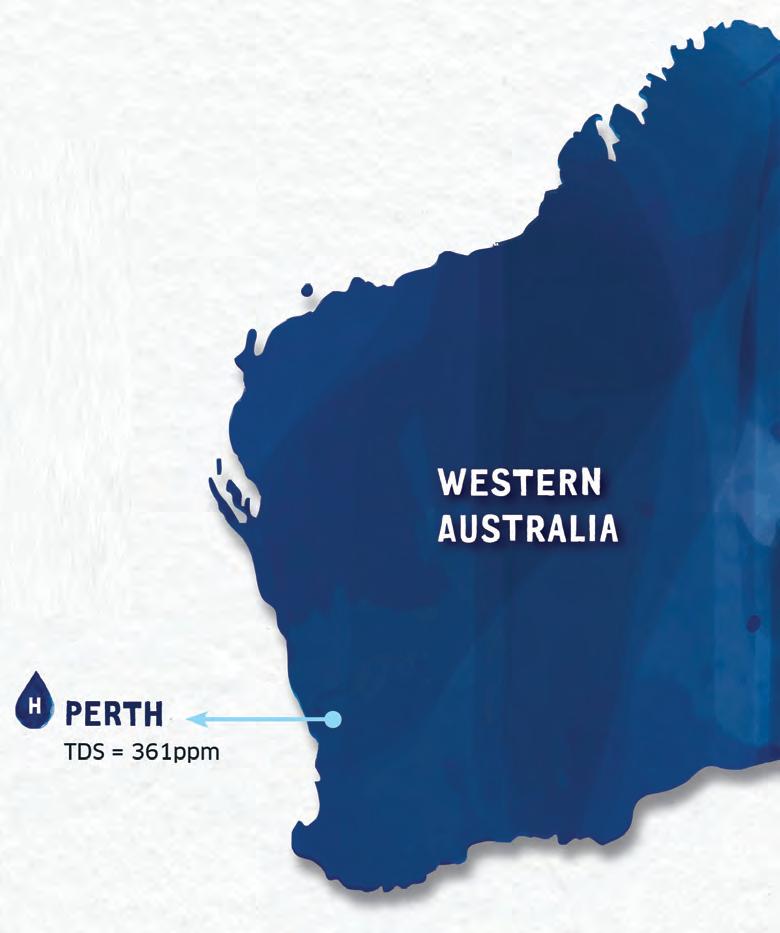
4 minute read
THE WILD WEST
Anthony Bosco is the Managing Director of Espresso Works.
Anthony Bosco of Espresso Works in Western Australia discusses the importance of water filtration in Australia’s hardest water state.
The eastern states may be more famous for their booming coffee cultures, but that same quality can be found across Australia.
At Espresso Works, we provide maintenance and sales of the finest coffee machines and associated products to coffee shops across Western Australia. We work with some of the biggest brands in coffee, including XLVI, Wega, Rocket, SAB, Slayer, La Marzocco, ECM, Mazzer and Fiorenzato just to name a few.
Over in the west we have our own unique challenges to the rest of Australia, water quality being one of them. But relationships with partners like BRITA help us overcome them. Tap water in Western Australia comes from a variety of different sources, including desalination plants and above ground dams.
Simple groundwater also contains an abundance of minerals – including sodium, potassium, calcium, and magnesium, as well as organic matter – which requires our drinking water to be treated with chlorine and fluoride, which acts as a disinfectant. This water often goes on a longer journey from the reservoir to the tap than in smaller states, providing more opportunity to pick up the minerals along the way.
The mineral content in Western Australian water is relatively high for these reasons, resulting in a level of “hardness” which can cause a build-up of limescale within a coffee machine over time. These minerals can also change the flavour of the

coffee you’re extracting, making it difficult to achieve consistency in the café.
BRITA use a four-stage system in its Quell filters designed for coffee machines and similar appliances to protect that equipment from the build-up of limescale. This reduces blockages or leaks over time and ultimately ensures the water within your coffee machine is protected from certain tastes and odours, ensuring the best possible tasting coffee.
Café owners and baristas sometimes ask me ‘why should I use a water filter instead of distilled water to make coffee?’
Despite seeming like a simple solution, distilled water actually adversely affects both coffee extraction as well as machinery health. In terms of extraction, certain minerals such as calcium and magnesium play a vital role in the extraction process by binding to coffee, ensuring a more flavourful brew. Along with a specific level of bicarbonates, they also reduce sour or flat flavour profiles and as such, you want some of these minerals to remain so you don’t extract a flat tasting coffee.
As well as their important role in extraction, certain minerals act on the drinker’s taste receptors and ultimately affect their perception of coffee flavour.
BRITA has a variable bypass system built into its filter heads, which dictates the level of filtration needed, so you have just enough to extract your desired flavours. For your machinery, this ensures the correct function of particular parts such as water level probes, which rely on the conductive properties of mineralised water.
Due to the polar nature of a water molecule, distilled water can also leach minerals and metals from within your machinery. Ultimately using a BRITA filter wins out and ensures the correct function and health of your coffee machine while also guaranteeing the best flavour profile from the extraction process. The second question I’m often asked is ‘which type of filter is best for my machine?’
I’ve worked with BRITA for Espresso Work’s water filtration solutions for more than a decade. Thanks to their efficiency and the fantastic and professional support from the company, I’ve never had to go with anyone else.
BRITA provides a range of filters along with a series of different sized filters suitable for tackling different volumes of water.
The Purity C Quell and Purity C Finest filters are specifically designed for coffee machines and vending machines. The C50 filter is typically used for domestic units, C150 for two-group machines, C300 for three-group machines, and C500 or C1100 for high-volume accounts.
The Quell range can filter water with an operational life ranging from 960 litres for the C50 all the way up to 11,500 litres for the C1100. The Purity C Quell uses a decarbonisation filter, designed for areas with a carbonate hardness higher than permanent hardness.
The Finest range come in the same sizes as the Quell, has a capacity ranging from 1100 litres up to 6000 litres, and specialises in softening water. BRITA filters all use the same filter head and are designed for ease of installation with the ability to fit into tight spaces, with a simple locking mechanism to safe house your filter post installation.
The in-built bypass technology within BRITA filter heads ensure consistently highquality filtered water, and improved taste of coffee compared to tap or distilled water. Ultimately, this provides protection of your coffee machine, reducing downtime and repair costs.

Western Australia has a higher average water hardness level than eastern states.
Disclaimer: TDS has been taken in a CBD location and readings can vary.










